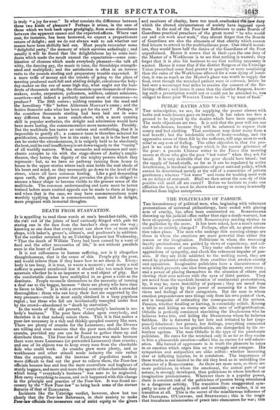DEATH FROM STARVATION.
IT is appalling to read these words at one's breakfast-table, with the rich red of the joints of beef curiously fringed with pale fat staring one in the face from the butcher's shop over the way_; knowing as one does that every street can show two or more such shops, with baker's, grocer's, oilman's, and poulterer's in addition. Yet the verdict returned by an Uxbridge Inquest last Wednesday, "That the death of William Terry had been caused by a want of food and the other necessaries of life," is not without parallels even in the heart of London.
It is not callousness to human suffering, nor is it altogether thoughtlessness, that is the cause of this. People pity the poor, and would relieve them if they knew how to set about it. Every- body is too busy, it is true, to waste a moment ; and many a real sufferer is passed unrelieved lest it should take too much time to ascertain whether be is an impostor or a real object of pity. But the comfortable classes have multiplied in as great a ratio as the destitute. People reconcile themselves to the necessity of turning a deaf ear to the beggar, because "there are plenty who have time to listen to him." It is with a crowded country as with a crowded thoroughfare : those who can keep their feet are supported by the very pressure—credit is most easily obtained in a busy populous region ; but those who fall are involuntarily trampled under foot by the crowd—abandoned to" death by starvation. In the words of the old proverb, "everybody's business is no- body's business." The poor have claims upon everybody, and therefore it is that nobody minds them. This it is that makes a poor-law necessary in a rich and thickly-peopled country like ours. There are plenty of crumbs for the Lazaruses; and the Diveses are willing and even anxious that the poor men should have the crumbs, provided any one can be found to gather them up and distribute them. The Poor-law of ELizansru was made because there were more Lazaruses (or pretended Lazaruses) than crumbs; and one of its objects was to keep every man from the charitable dole who could work. As crumbs grew more plenty, and as workhouses and other stimuli made industry the rule rather than the exception, and the increase of population made it more difficult to find out the poor to relieve them, the Poor-law officials became less and less the mere controllers and bugbears of sturdy beggars, and more and more the agents of that charitable duty which being "everybody's business" was sure to be neglected. Men carry everything to excess, and so it happened with this change in the principle and practice of the Poor-law. It was found ne- cessary by the "New Poor-law" to bring back some of the sterner features of that of ELIZABETH.
Incidents like the Uxbridge verdict, however, show but too clearly that the Poor-law Reformers, in their anxiety to make Poor-law officials the measurers out of strict equity to the givers
and receivers of charity, have too much *wed duty
which the altered circumstances of society hats .icappkal upon them. In the zeal of the Poor-law Reformers to make Boards of Guardians practical preachers of the great moral "he who would eat and can work must work," they almost forget that the Boards of Guardians are also the almoners of that charity which cannot find leisure to attend to the multitudinous poor. One-idea'd moral- ists, they would leave half the duties of the Guardians of the Poor unperformed. Hence it comes that in their eyes the one duty of the Master of a Workhouse is to see that nothing is wasted; they forget that it is also his business to see that nothing necessary is wanted. Hence it came that if the district Surgeon of the Uxbridge Union prescribed some food greater in quantity or more nourishing than the rules of the Workhouse allowed for a man dying of inani- tion, it was as much as the Master's place was worth to supply the- food, even though the wretched patient were in extrends, betbre he had sent a messenger four miles to receive the consent of the Re- lieving-officer; and hence it came that the district Surgeon, know- ing such a prescription would not or could not be attended to, was obliged to leave poor WILLIAM TERRY to die "by want of food."


























 Previous page
Previous page